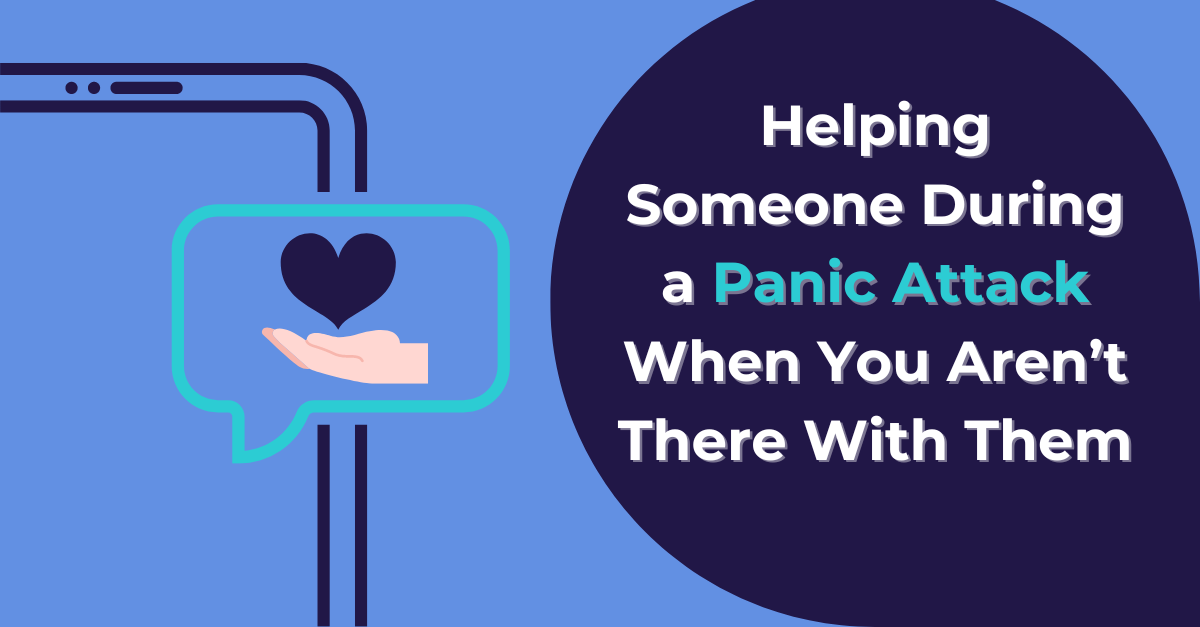September 23rd, 2022

Helping someone get through a panic attack can be difficult, especially when you are not with them. Luckily with the advancement of technology and the ability to text and message on several different platforms, helping someone get through a panic attack can be done whether you are present or not.

You first want to examine the symptoms to verify the person is suffering from a panic attack. Symptoms of a panic attack include a pounding or racing heart, chills, trembling, chest pain, difficulty breathing, weakness or dizziness, stomach pain or nausea, tingling or numbness in hands, and sweating (National Institutes of Health, 2022).
Panic attacks usually occur because of fear or worry of impending doom or loss of control. Unlike anxiety attacks, panic attacks have no apparent trigger and often happen randomly, whereas anxiety attacks become triggered by a thought, overstimulation, a memory, etc. Panic attacks only last a few minutes, whereas anxiety attacks can last longer.
Those who have experienced panic attacks have compared it to feeling like a heart attack. Panic attacks can be a scary experience, especially if you have never had one. Panic attacks can be devastating both physically and mentally. During a panic attack, the person often feels crippling fear to the point that their mind gets stuck in that place until they are able to calm down.
Imagine yourself going down a rabbit hole of everything that scares you and every worst-case scenario that can happen in your life and playing through all those things simultaneously. Now couple that with the physical symptom of not being able to catch your breath, almost like you are drowning- this is how a panic attack can feel. So how do you support someone going through this without physically being there?

Say a friend or loved one sends you a message that they believe they are feeling a panic attack coming on or are actively in one. How would you respond? It is critical to respond empathetically, non-judgmentally, and appropriately to help the person make it through.
Help them identify and name their symptoms; this will help not only validate their feelings but also help decipher whether the symptoms are those of a panic attack or something worse. Let them know they can handle this and are doing a great job. Help to instill confidence in them without minimizing or dismissing their feelings. Let them know you are there and will help them through. Remind them of the importance of breathing. Ask what you can do and how you can support them during this time.
Guide them through a grounding technique, as this can be the most valuable and powerful tool you can offer someone during a panic attack. Grounding techniques are exercises used for anxiety and panic attacks that help the person return to a state of stability by refocusing their attention on the present moment. Grounding engages the senses to allow the brain to refocus on those and regain a state of calm. One of the most popular grounding techniques is the 54321-grounding technique. With this grounding technique, you will instruct the person to identify:
Again, this will engage the senses one by one, thus calming the brain by relaxing the body and allowing it to send messages to the brain, saying, “we are in a safe space, and we are in control.”

Now that we have looked at how to send a message to someone having a panic attack let’s delve into what to say and what not to say to someone suffering a panic attack. First, remember that allowing yourself to stay calm is crucial to helping the person calm down. Validate their feelings and offer help. Say things like:
“You are so strong.”
“I am so proud of you.”
“You are going to get through this.”
“This will pass soon.”
“Take a deep breath in and breathe out slowly.”
Encouragement will go a long way; imparting confidence in the person will help them rise above. Establishing care and understanding for someone in a time like this may save their life and can be the difference in helping or hindering a panic attack. When assisting someone during this, try not to make it about yourself. Remember that it is okay to ask the person if they are okay, but do not keep asking this, as it can worsen things. Do not say anything like:
“It is not that bad.”
“You are overreacting.”
“Just calm down.”
Also, consider that when offering support, aim to avoid comparing your situation to theirs. Do not state, “I know exactly how you feel,” because although the conditions may be similar, the feelings are likely very different. Everyone endures things individually and trying to tell someone that you know how they feel can feel very insensitive and deter them from seeking help from you again.
Texting someone who is going through anxiety can be challenging, mainly if you have never been in that situation. The best thing you can do to help is to be mindful of what you say and how you address the person you are helping. Keep in mind that kindness, patience, and understanding go a long way.
Written by: Emily Shelton, LCPC, CADC, CRSS.
At Clarity Clinic, we have highly trained staff who specialize in therapy and psychiatry services. To learn more about how we can support your mental health, call Clarity Clinic at (312) 815-9660 or schedule an appointment today.
Our Services
Virtual/Online CarePHP and IOPAdult PsychiatryChild & Adolescent PsychiatryAdult TherapyChild & Adolescent TherapyCouples CounselingFamily TherapyGroup TherapyPsychological TestingTranscranial Magnetic Stimulation (TMS)